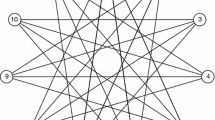Abstract
In this paper, we introduce a Reformulation-Linearization Technique-based open-source optimization software for solving polynomial programming problems (RLT-POS). We present algorithms and mechanisms that form the backbone of RLT-POS, including constraint filtering techniques, reduced RLT representations, and semidefinite cuts. When implemented individually, each model enhancement has been shown in previous papers to significantly improve the performance of the standard RLT procedure. However, the coordination between different model enhancement techniques becomes critical for an improved overall performance since special structures in the original formulation that work in favor of a particular technique might be lost after implementing some other model enhancement. More specifically, we discuss the coordination between (1) constraint elimination via filtering techniques and reduced RLT representations, and (2) semidefinite cuts for sparse problems. We present computational results using instances from the literature as well as randomly generated problems to demonstrate the improvement over a standard RLT implementation and to compare the performances of the software packages BARON, COUENNE, and SparsePOP with RLT-POS.



Similar content being viewed by others
References
Androulakis, I.P., Maranas, C.D., Floudas, C.A.: \(\alpha \)BB: a global optimization method for general constrained nonconvex problems. J. Global Optim. 7, 337–363 (1995)
Anstreicher, K.M.: Semidefinite programming versus the Reformulation-Linearization Technique for nonconvex quadratically constrained quadratic programming. J. Global Optim. 43(2–3), 471–484 (2009)
Anstreicher, K.M.: On convex relaxations for quadratically constrained quadratic programming. Math. Program. 136(2), 233–251 (2012)
Balas, E., Ceria, S., Cornuejols, G.: Mixed 0–1 programming by lift-and-project in a branch-and-cut framework (1996)
Bazaraa, M.S., Sherali, H.D., Shetty, C.M.: Nonlinear Programming: Theory and Algorithms, 3rd edn. Wiley, New York (2006)
Belotti, P., Lee, J., Liberti, L., Margot, F., Wächter, A.: Branching and bounds tightening techniques for non-convex MINLP. Optim. Methods Softw. 24(4–5), 597–634 (2009)
Cafieri, S., Hansen, P., Létocart, L., Liberti, L., Messine, F.: Compact relaxations for polynomial programming problems. In: Klasing, R. (ed.) Experimental Algorithms, Lecture Notes in Computer Science, vol. 7276, pp. 75–86. Springer, Berlin (2012)
Dalkiran, E., Sherali, H.: Theoretical filtering of RLT bound-factor constraints for solving polynomial programming problems to global optimality. J. Global Optim. 57(4), 1147–1172 (2013)
Gill, P.E., Murray, W., Saunders, M.A.: SNOPT: an SQP algorithm for large-scale constrained optimization. SIAM Rev. 47(1), 99–131 (2005)
Hock, W., Schittkowski, K.: Test Examples for Nonlinear Programming Codes, Lecture Notes in Economics and Mathematical Systems. Springer-Verlag, Berlin Heidelberg, New York (1981)
Ibm, ILOG CPLEX Optimization Studio. http://www.ilog.com/products/cplex
Lasserre, J.B.: Semidefinite programming vs. LP relaxations for polynomial programming. Math. Operations Res. 27(2), 347–360 (2002)
Lasserre, J.B.: Convergent SDP-relaxations in polynomial optimization with sparsity. SIAM J. Optim. 17(3), 822–843 (2006)
Laurent, M., Rendl, F.: Semidefinite Programming and Integer Programming. In: Aardal, K., Nemhauser, G., Weismantel, R. (eds.) Handbook on Discrete Optimization, pp. 393–514. Elsevier, Amsterdam (2005)
Liberti, L.: Linearity embedded in nonconvex programs. J. Global Optim. 33, 157–196 (2005)
Liberti, L., Pantelides, C.C.: An exact reformulation algorithm for large nonconvex NLPs involving bilinear terms. J. Global Optim. 36, 161–189 (2006)
MATLAB: version 7.12.0 (R2011a). The MathWorks Inc., Natick, Massachusetts (2011)
Ryoo, H.S., Sahinidis, N.V.: A branch-and-reduce approach to global optimization. J. Global Optim. 8(2), 107–138 (1996)
Sherali, H.D., Adams, W.P.: A Reformulation-Linearization Technique for Solving Discrete and Continuous Nonconvex Problems. Kluwer Academic Publishers, Boston (1999)
Sherali, H.D., Adams, W.P.: A Reformulation-Linearization Technique (RLT) for semi-infinite and convex programs under mixed 0–1 and general discrete restrictions. Discrete Appl. Math. 157(6), 1319–1333 (2009)
Sherali, H.D., Dalkiran, E.: Combined bound-grid-factor constraints for enhancing RLT relaxations for polynomial programs. J. Global Optim. 51(3), 377–393 (2011)
Sherali, H.D., Dalkiran, E., Desai, J.: Enhancing RLT-based relaxations for polynomial programming problems via a new class of \(v\)-semidefinite cuts. Comput. Optim. Appl. 52(2), 483–506 (2012)
Sherali, H.D., Dalkiran, E., Liberti, L.: Reduced RLT representations for nonconvex polynomial programs. J. Global Optim. 52(3), 447–469 (2012)
Sherali, H.D., Fraticelli, B.M.P.: Enhancing RLT relaxations via a new class of semidefinite cuts. J. Global Optim. 22(1–4), 233–261 (2002)
Sherali, H.D., Tuncbilek, C.H.: A global optimization algorithm for polynomial programming problems using a Reformulation-Linearization Technique. J. Global Optim. 2(1), 101–112 (1992)
Sherali, H.D., Tuncbilek, C.H.: New reformulation linearization/convexification relaxations for univariate and multivariate polynomial programming problems. Operations Res. Lett. 21(1), 1–9 (1997)
Sherali, H.D., Wang, H.: Global optimization of nonconvex factorable programming problems. Math. Program. 89(3), 459–478 (2001)
Sturm, J.F.: Using sedumi 1.02, a matlab toolbox for optimization over symmetric cones. Optimiz. Methods Softw. 11(1–4), 625–653 (1999)
Tawarmalani, M., Sahinidis, N.V.: A polyhedral branch-and-cut approach to global optimization. Math. Program. 103(2), 225–249 (2005)
Waki, H., Kim, S., Kojima, M., Muramatsu, M.: Sums of squares and semidefinite program relaxations for polynomial optimization problems with structured sparsity. SIAM J. Optim. 17(1), 218–242 (2006)
Waki, H., Kim, S., Kojima, M., Muramatsu, M., Sugimoto, H.: SparsePOP—a sparse semidefinite programming relaxation of polynomial optimization problems. ACM Trans. Math. Softw. 35(2), 15:1–15:13 (2008)
Zorn, K., Sahinidis, N.V.: Global optimization of general nonconvex problems with intermediate polynomial structures. J. Global Optim. 59(2–3), 673–693 (2014)
Acknowledgments
The authors gratefully acknowledge Nick Sahinidis at Carnegie Mellon University for permitting the use of the BARON solver.
Author information
Authors and Affiliations
Corresponding author
Additional information
This research has been supported by the National Science Foundation under Grant No. CMMI-0969169.
Appendix
Appendix
PP1 (Problem 119 in [10], where the parameter data is specified in (22) and in Table 13):
PP2 (Problem 119 in [10]—as given by Problem PP1, but with a modified objective function):
PP3 (Problem 119 in [10]—as given by Problem PP1, but with a modified objective function):
PP4 (Problem 49 in [10]—, along with imposed variable bounds):
PP5 (Problem 50 in [10]—, along with imposed variable bounds):
Rights and permissions
About this article
Cite this article
Dalkiran, E., Sherali, H.D. RLT-POS: Reformulation-Linearization Technique-based optimization software for solving polynomial programming problems. Math. Prog. Comp. 8, 337–375 (2016). https://doi.org/10.1007/s12532-016-0099-5
Received:
Accepted:
Published:
Issue Date:
DOI: https://doi.org/10.1007/s12532-016-0099-5
Keywords
- Reformulation-Linearization Technique (RLT)
- Open-source code
- Constraint filtering strategies
- Valid inequalities
- Reduced RLT representations
- Polynomial programming




